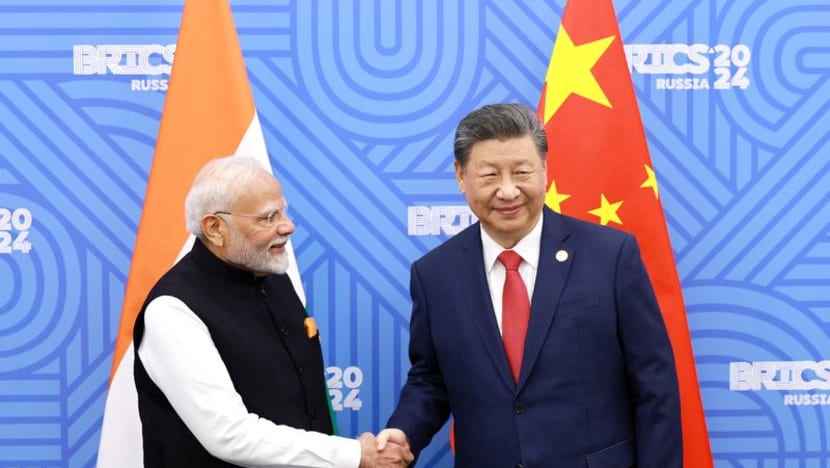World
Xi and Modi Seek Friendship Amidst Geopolitical Shifts

Chinese President Xi Jinping and Indian Prime Minister Narendra Modi engaged in a significant meeting on March 15, 2024, during the Shanghai Cooperation Organization (SCO) summit in Tianjin, China. Their discussions centered on strengthening ties between the two nations, emphasizing the importance of friendship and cooperation as both countries navigate complex global challenges.
In his opening remarks, Xi highlighted the shared status of China and India as two of the world’s most populous and culturally rich nations. He stated, “It is vital to be friends, a good neighbour, and for the ‘dragon’ and the ‘elephant’ to come together.” This metaphor underscores the potential for collaboration between the two countries, which have historically faced tensions but are now seeking a more amicable relationship.
Modi, on his first trip to China in seven years, acknowledged the progress made in bilateral relations since last year. He remarked, “We are committed to taking our relations forward on the basis of mutual trust, respect and sensitivity.” Modi also noted that a “peaceful and stable” atmosphere had been established following the disengagement along their disputed border.
The meeting lasted nearly an hour and occurred in the context of a broader strategic realignment influenced by external pressures, particularly from the United States. Relations between Beijing and New Delhi deteriorated significantly after a deadly border clash in 2020. However, both nations have since taken steps towards rebuilding their partnership, especially in light of rising US tariffs that have impacted their economies.
While the Xi-Modi discussions are not expected to resolve major disputes, Modi’s presence in Tianjin signals a shift in strategy to address geopolitical vulnerabilities. Notably, Modi will not attend the military parade in Beijing on March 16, which will feature Xi alongside Russian President Vladimir Putin and North Korean leader Kim Jong Un.
The United States has been actively courting India as a counterbalance to China, yet recent developments, including a 50 percent tariff on Indian goods imposed by Washington, complicate this relationship. The tariffs target India’s purchases of Russian oil, a move Delhi has resisted, insisting on its right to protect national interests and diversify its trade partnerships.
Modi’s visit to China follows his talks in Japan, where he and Japanese Prime Minister Shigeru Ishiba signed an economic security initiative. This agreement focuses on collaboration in critical sectors such as semiconductors, artificial intelligence, and clean energy, with Japan pledging USD 67 billion in investments over the next decade.
In summary, the meeting between Xi and Modi marks a pivotal moment for China-India relations, reflecting a desire for cooperation amidst a challenging geopolitical landscape. The outcomes of their discussions will likely play a role in shaping the future dynamics of the Global South, as both countries seek to enhance their influence on the world stage.
-

 Lifestyle4 months ago
Lifestyle4 months agoHumanism Camp Engages 250 Youths in Summer Fest 2025
-

 Business5 months ago
Business5 months agoKenvue Dismisses CEO Thibaut Mongon as Strategic Review Advances
-

 Sports4 months ago
Sports4 months agoDe Minaur Triumphs at Washington Open After Thrilling Comeback
-

 Sports5 months ago
Sports5 months agoTupou and Daugunu Join First Nations Squad for Lions Clash
-

 Top Stories5 months ago
Top Stories5 months agoColombian Senator Miguel Uribe Shows Signs of Recovery After Attack
-

 World5 months ago
World5 months agoASEAN Gears Up for Historic Joint Meeting of Foreign and Economic Ministers
-

 Health4 months ago
Health4 months agoNew Study Challenges Assumptions About Aging and Inflammation
-

 Business5 months ago
Business5 months agoOil Prices Surge Following New EU Sanctions on Russia
-

 Entertainment4 months ago
Entertainment4 months agoDetaşe-Sabah Violin Ensemble Captivates at Gabala Music Festival
-

 Entertainment4 months ago
Entertainment4 months agoBaku Metro Extends Hours for Justin Timberlake Concert
-

 Top Stories5 months ago
Top Stories5 months agoRethinking Singapore’s F&B Regulations Amid Business Closures
-

 Business5 months ago
Business5 months agoU.S. House Approves Stablecoin Bill, Sends to Trump for Signature









